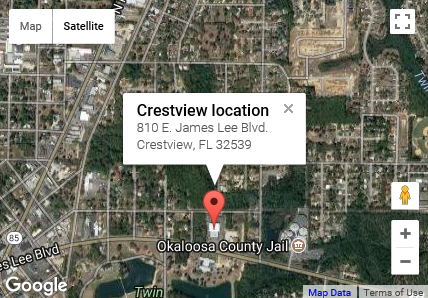Frequently Asked Questions
Contact us
- 850-689-5593
- Okaloosa-Dental@flhealth.gov
-
Fax
850-689-5928 -
Mailing Address
810 James Lee Blvd.
Crestview, FL 32539
- Why are baby teeth so important?
- What is baby bottle rot?
- What are sealants? Why does my child need them?
- Where is the dental clinic located?
1. Why are baby teeth so important?
Baby or primary teeth may be temporary, but they deserve good care.
A child needs strong, healthy primary teeth to chew, speak and have a good-looking smile! These baby teeth also help keep a space in the jaw for adult teeth. If a baby tooth is lost too early, the teeth beside it may move into the empty space.
When it's time for adult teeth to come in, there may not be room. This can make teeth crooked or crowded. Baby teeth are at risk for decay as soon as they first appear, typically around 6 months of age.
Start cleaning your baby's mouth early. Before teeth appear, wipe the baby's gums with a wet washcloth or a clean gauze pad after each feeding. As soon as the first tooth appears, start brushing your baby's teeth twice a day (morning and night). Use a soft-bristled, child-sized toothbrush and a fluoride toothpaste.
The American Dental Association recommends using a smear of toothpaste (size of a grain of rice) for children under 3.
Top of Section2. What is baby bottle rot?
Baby bottle rot is caused by regular contact with sugary drinks. This can happen when your baby goes to bed with a bottle. It can also happen when bottles are used as a pacifier.

The good news is baby bottle tooth decay is preventable. Follow these tips:
- Don’t put your baby’s spoon or pacifier in your mouth.
- Wipe your baby’s gums with a clean, damp cloth after each feeding.
- When your child’s teeth come in, brush them gently with a child-size toothbrush and a smear (or grain of rice sized amount) of fluoride toothpaste until the age of 3.
- Brush the teeth with a pea-sized amount of fluoride toothpaste from the ages of 3 to 6.
- Supervise brushing until your child can spit and not swallow toothpaste, usually not before age 6 or 7.
- Place only formula, milk or breast milk in bottles. Never put sugar water, juice or soft drinks in a bottle.
- Baby’s should finish their bedtime and nap time bottles before they go to bed.
- Use a clean pacifier. Don’t dip it in sugar or honey.
- Encourage your child to drink from a cup by his/her first birthday.
- Encourage healthy eating habits.
- See a dentist after the first tooth appears.
3. What are sealants? Why does my child need them?
Dental sealants are thin, plastic coatings that protect the chewing surfaces. They are placed on children's back teeth to prevent decay. Sealant material is painted on as a liquid, then hardens to a solid shield over the tooth. The process is simple and painless. Children should get sealants as soon as their permanent molars come in.
Before After
Sealants are safe. There is more BPA in the air we breathe than in dental sealants.
Sealants work. Sealants lower the risk of tooth decay by 80%.
Top of Section4. Where is the dental clinic located?
We are located at 810 E. James Lee Blvd. in Crestview.
- The clinic is .2 miles west of Twin Hills Park, across from Northwest Florida State College.
- The clinic is .2 miles west of the Okaloosa County Jail.






Connect with DOH